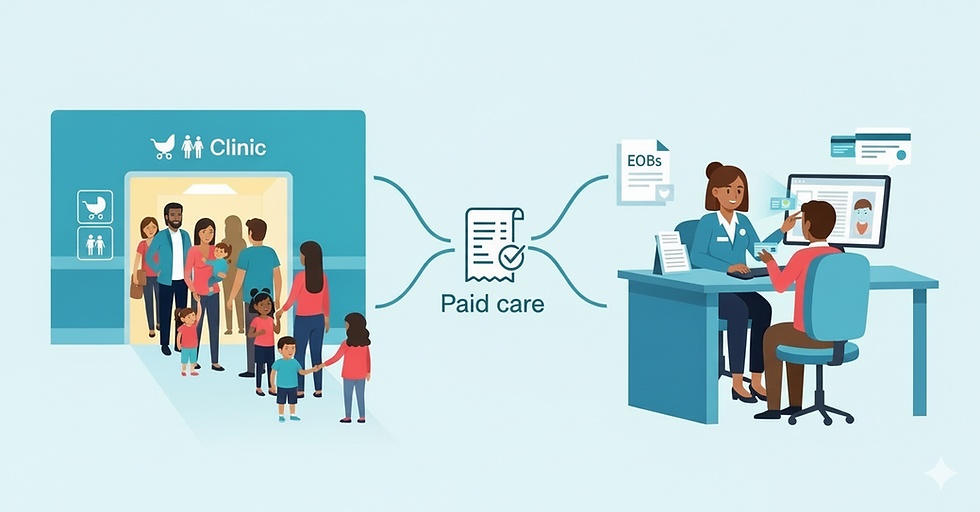Unlocking Mental Health Equity: How New Rules Could Transform Access to Care
- Nicholas Burt, LMFT

- Oct 19, 2023
- 3 min read
Introduction
In July 2023, the U.S. Departments of Labor, Health and Human Services, and Treasury jointly announced proposed rules aimed at enhancing the implementation of the Mental Health Parity and Addiction Equity Act (MHPAEA). These proposed regulations signal a significant development for mental health treatment providers, potentially affecting the way they bill insurance companies for their patients. In this blog post, we'll break down the key points from the article provided by the Department of Health and Human Services and discuss their implications for mental health providers, including those who utilize Bridgeway Billing's services.

Mental Health Parity and Addiction Equity Act (MHPAEA)
The MHPAEA was originally enacted in 2008, with the intention of ensuring that mental health and substance use disorder benefits are treated on par with medical and surgical benefits. However, its enforcement and implementation have faced challenges over the years, prompting the need for a more comprehensive regulatory framework.
Key Points from the Proposed Rules
Expanding the Scope: The proposed rules seek to expand the scope of MHPAEA to cover more individuals and health plans. This means that a broader range of patients may benefit from improved access to mental health and substance use disorder treatment.
Disclosure Requirements: The rules emphasize the importance of transparency, requiring health plans to provide clear, understandable information to consumers regarding their mental health and substance use disorder benefits.
Quantitative Treatment Limitations: The proposed regulations also tackle quantitative treatment limitations, which include the numerical limits on services, such as the
number of therapy sessions or inpatient days, ensuring that these limitations are not unfairly stacked against mental health and substance use disorder benefits.
Implications for Mental Health Treatment Providers

The proposed rules have several important implications for mental health treatment providers.
Increased Patient Access: By expanding the scope of MHPAEA, more patients will be able to access mental health and substance use disorder treatment, which can lead to an increased demand for services. Providers may need to prepare for potential growth in their patient caseload.
Documentation and Transparency: Mental health providers will need to ensure they have clear, accurate, and comprehensive documentation to meet the transparency requirements of the proposed rules. This includes explaining the benefits and limitations of services to their patients.
Billing and Claims Management: Mental health providers may need to adapt to any changes in insurance billing and claims processing. Compliance with the new rules will be crucial to avoid potential issues with insurance reimbursements.
Adapting to Regulatory Changes: Mental health providers should stay informed about the evolving regulatory landscape and be prepared to adapt their practices to meet the new requirements effectively. This includes revising treatment protocols, updating compliance procedures, and ensuring their billing practices align with the changing landscape.
How Bridgeway Billing Can Assist:

Enhancing Documentation and Transparency:
Bridgeway Billing can be a valuable ally for mental health providers when it comes to documentation and transparency. Here's how:
Benefit Verification: Bridgeway Billing can assist in verifying patients' insurance benefits accurately, allowing providers to convey precise information to patients about their mental health and substance use disorder benefits. This aligns with the proposed rules' emphasis on transparency.
Regular Auditing: Bridgeway Billing can conduct regular audits and reviews to ensure that documentation is consistent with the services provided, enhancing transparency and compliance with the new regulations.
Training: Bridgeway Billing can conduct regular training with your staff to ensure that your documentation meets insurance and regulatory standards.
Efficient Billing and Claims Management:
Efficient billing and claims management are crucial for mental health providers, especially in light of changing regulations. Bridgeway Billing streamlines this process in several ways:
Real-Time Claim Submission: Bridgeway Billing offers real-time claim submission, reducing the risk of delays and ensuring that providers can take full advantage of the updated regulations promptly.
Claim Monitoring: Our team closely monitors the status of submitted claims, helping providers track their progress and address any issues swiftly.
Coding Compliance: Bridgeway Billing is equipped to ensure that claims are coded accurately to meet the new regulatory standards, preventing potential denials and rejections.
Documentation Assistance: Bridgeway Billing can assist providers in creating comprehensive claim documentation that aligns with the updated rules, reducing the likelihood of compliance issues.
By leveraging Bridgeway Billing's services for documentation and billing, mental health providers can streamline their operations and maintain compliance with the evolving regulations, ultimately ensuring that their patients receive the full benefits to which they are entitled.
Conclusion
The proposed rules to strengthen the Mental Health Parity and Addiction Equity Act are a promising step toward improving mental health and substance use disorder treatment access in the United States. Mental health treatment providers, whether or not they use Bridgeway Billing, should be aware of these potential changes in regulation, as they may impact their practices, documentation, and collaboration with insurance companies. This development emphasizes the ongoing importance of mental health parity and its role in ensuring equitable access to crucial mental health services for all Americans.




Comments